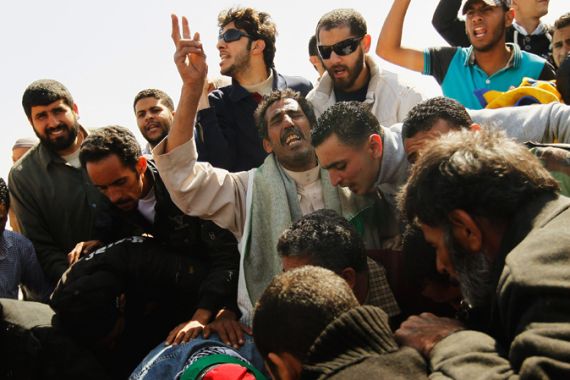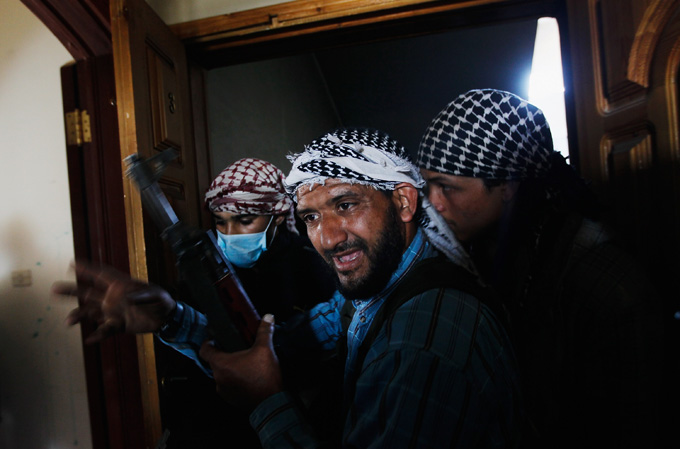Libya: Filling the void of a stateless state
The Libyan struggle for self-determination must be rooted in its core by a strong civic society, scholar argues.

 |
| From the outset, Gaddafi managed to militarise the popular uprising against him, which ultimately delayed the construction of a strongly democratic civic society [GALLO/GETTY] |
Winning the moral fight for a democratic Libya, as challenging as it may be, is compellingly imperative; it remains the most potent ammunition in the rebel’s inventory for defeating Gaddafi.
The battle for Libya must not be solely focused on and reduced to a fight for the gain of territory or the ousting of a tyrant. Military victory will not determine who rules the Libyan people. The Libyan people will determine who earns their consent and trust to rule.
The Maghrebi peoples – in Libya as in Algeria – know too well that at the end of military victory could lurk despotic nationalism, populism and demagogy, spawned from singular and brutal revolutionary legitimacy. The current popular empowerment movement in Libya challenges the country’s nascent civil society to seize the day in order to rally democratic voices and construct an emancipatory civic society (demos).
Therein lays the seeds of self-realisation, self-definition and a new imagining of a democratic community.
Earning democracy
The current situation though shows a temporary hiatus in the people’s power struggle in Libya.
However, this hiatus can be capitalised on to construct the building blocks of a civic society that will, in the future, sustain and deepen popular empowerment, and road-mapping post-Gaddafi political renewal in order to avoid an institutional and democratic void when the Gaddafis are departed.
Gaddafi worked from the outset to derail Libya’s people’s power revolt, as well as sow the seeds of doubt on it. To this end, he sought to militarise the revolution since the first signs of popular disobedience and protest became apparent.
Hence he rushed to implicate al-Qaeda in the uprising. However, Gaddafi failed to impress internal and external audiences, proving he learned nothing from his old friend Ben Ali, whose blaming of terrorists did not prevent his ousters. Blaming al-Qaeda is an act of desperation intended to safeguard Gaddafi’s decayed and delegitimised 42-year-old military coup-cum-‘Green revolution’-cum-dynasty.
Like in Tunisia and Egypt, people’s power potentialities have proven their worth in Libya, debunking stereotypes about the passivity and submissiveness of the Arab citizenry.
For now, Gaddafi may have won the battle to militarise the uprising. The Libyan civic society, still under construction, must win the war. That is, the war for democracy, and not the war as preponderance through the barrel of a gun. Prevailing through the pursuit of power through the barrel of the gun is all that is left for Gaddafi to further delude his narcissist psyche and elude his confused generals.
Militarisation of Libya’s people’s revolt
Gaddafi is now left only with the consolation prize of winning small battles against a people whose majority clearly no longer want him or his sons.
There is nothing else Gaddafi can now win – maybe only safe passage for himself and his family. Although his sons will now proceed and attempt to re-package themselves as ‘prophets’ of good government in the territory under their control.
The rebels are no match for the Gaddafi militarily, but they can outclass him with heavy reliance on civic power, legal muscle and the democratic re-imagining of Libya’s polity. Mandela did not win against Apartheid with the ANC’s guns. He fought a moral war and won it through the ballot, not the bullet.
This lesson from South Africa must not escape the attention of all peoples struggling for self-determination in Arab North Africa.
Re-imagining community
The re-imagining of Libya’s community requires, first and foremost, working with existing local human and intellectual resources and values as well as some ‘democratic learning’ from the global ‘South’. No other prerequisite overrides this for the sake of smooth transition from revolutionary to constitutional/democratic polity.
Currently, there is a formidable repository of knowledge arrayed against Gaddafi and co.
Some of it resides in the human resources that courageously defected from the Gaddafi camp. These include Gaddafi’s cousin and special envoy Ahmed Kadaf al-Dam, Ali Treki who served as the Colonel’s Foreign Minister for many years, ex-Interior minister General Abd al-Fattah al-Abidi, and Mustafa Abd al-Jalil, formerly Justice Minister.
To their credit, all switched sides in protest at Gaddafi’s use of violence against civilians.
Though this civic society – demos – is still under construction, it is currently comprised of two main components: the recently founded National Transitional Council (NTC), and a promising demos still under construction with the potentialities to contribute credibility, visionary input, leadership and civic verve and know-how.
The search for symbols
The biggest challenge confronting the construction of a Libyan demos is the institutional void. Unlike Egypt and Tunisia, Libya is a state only in its capacity to coerce and distribute. It is not an exaggeration to state that Gaddafi’s Libya is an oddity or rarity: a ‘state-less state’.
Note how the rallying myths and emblems of the popular uprising and current rebellion are pre-Gaddafi. They include the tricolour flag or the liberal constitution dating back to the era of King Idriss, in the late 1950s. As if Libyans are invoking the symbols of King Idriss to counter the delegitimised symbols and icons of ‘King’ Gaddafi.
This frame of reference is drawn upon for two interconnected reasons: firstly, to address the institutional void and secondly to give the Libyan people’s revolution an ideational foundation, a source of symbols that provide cohesion, anchorage, rallying myths, sense of mission, and a ‘cake of values’ that together have the potential to catapult an amorphous mass of subjects into a self-governing people.
Like in Egypt and Libya, this quest for self-definition and self-governance was promptly translated into action when key anti-Gaddafi voices sought to organise themselves. The first attempt in this direction began on the third day of the uprising on the 20th of February, and focused on forming a Local Council.
The second attempt on the 24th of February after Benghazi was freed, ditching Gaddafi’s authority once and for all, gave birth to the first Local Council. The credit goes to the leading role played by Abd Al-Hafiz Ghoqa. Long-time political prisoner Salih al-Ghazal was assigned the task of co-ordinating the council’s work to be shared amongst 13 academics, lawyers, and other dissidents each overseeing a portfolio that included education, finance, commerce, security, youth and civil society and Islamic endowments.
There was an attempt to widen representation in that initial council, and this involved diverse ideological voices made up of independents, especially academics (Zahi al-M’ghribi and Najib al-Hasadi), the left (Mohammed Al-Mufti), the Muslim Brotherhood (Abdullah Shamiya), and civil libertarians (Ghoqa). This insatiable hunger for instituting a civic culture in Benghazi and other freed towns led to the initial civic body that provided the nucleus for the founding the NTC on March 5, 2011, led by Abd al-Jalil and Ghoqa as his deputy.
Challenges
The NTC faces three challenges. Firstly, it must not put all of its eggs, as it were, in one basket by focusing its fight against Gaddafi in the battlefield.
Politics can be a more formidable and ferocious means of carrying out the fight against the Colonel to arenas where he will always emerge as the losing party. The best of these is the legal arena, where Gaddafi and co. must answer for crimes against the Libyan people.
Secondly, the fight which is a safe bet to invest in greatly is democratisation: this is the very reason why the Libyans let themselves be inspired by Egyptians and Tunisians.
Finally, equally challenging is to know how to manage relations with EU states and the US, who only in the recent past backed Gaddafi despite his malfeasance, and today are putting their weight behind the Libyan people’s struggle against autocracy.
The Libyan people’s collective consent and authorship over its uprising must not be traded off for any price that might compromise their right to self-govern.
Dr Larbi Sadiki is a Senior Lecturer in Middle East Politics at the University of Exeter, and author of Arab Democratization: Elections without Democracy (Oxford University Press, 2009) and The Search for Arab Democracy: Discourses and Counter-Discourses (Columbia University Press, 2004).
The views expressed in this article are the author’s own and do not necessarily reflect Al Jazeera’s editorial policy.
